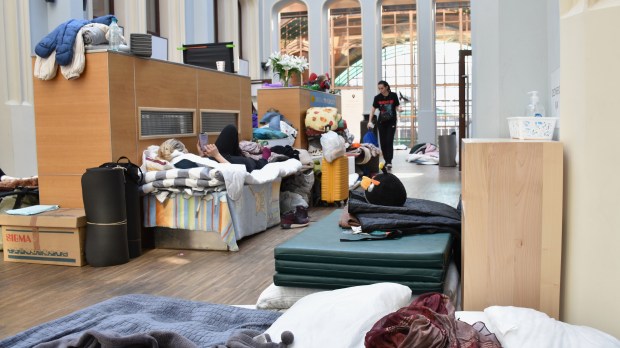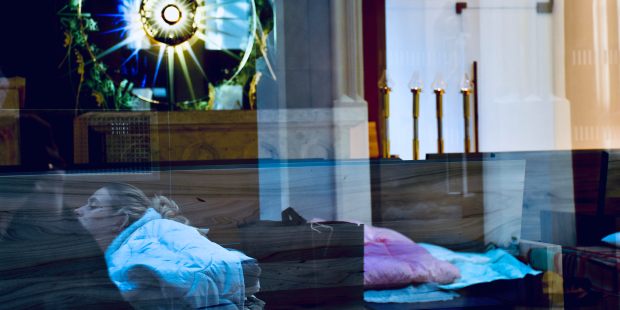The St. Catherine of Alexandria Eucharistic Adoration Chapel at the central railway station in Wrocław, Poland, was converted for a night into warm quarters for refugees from Ukraine.
“This was an exceptional situation and the volunteers who take care of the Ukrainians arriving in Wrocław and offer them safe shelter were forced to open the door to the chapel of perpetual adoration. As there was no priest at night and the Blessed Sacrament was left exposed, the weary and frightened people spent the night in the presence of the Lord Jesus,” says Fr. Jan Kleszcz, a chaplain for railroad workers who came up with the idea of a chapel of perpetual Eucharistic adoration.
Temporary shelter at a railway station
Now the exhausted refugees no longer sleep in the chapel, but many stop by during the day to pray. Instead, the hallways and the lobby, where the entrance to the chapel and the Session Hall is located, are filled with mattresses and camp beds.
During the day many of the beds are folded up to allow passage, but at night the floors are again laid with camp mats. The first floor of the railway station is very warm; the building has just undergone a major overhaul and the top hallways have wooden floors.
The historic Session Hall and the adjacent rooms have been divided into small cubicles, each occupied by mothers and their children. No one knows how long the temporary camp will continue to operate at the Wrocław train station, especially since not all refugees want to leave. Many have no intention of staying in Poland and do not want to settle down. They are waiting for the war to end soon and once it does, they want to return home.
Have a look at the chapel-turned-shelter at the railway station in Wrocław, Poland:
A holy place where you can sit down in the presence of God and cry
As many as 10,000 refugees from Ukraine a day are received at the Wrocław railway station. Around 500 spend the night on the first floor of the building in places prepared by volunteers and territorial army personnel. Will they be able to stay in the chapel should this be necessary again?
Fr. Jan replies: “The volunteers have my telephone numbers and if they call me, I come to transfer the Most Blessed Sacrament to the tabernacle. In case of need, the chapel can be used as a shelter for people to take some rest, it is obvious.
“However, we cannot designate it as a place of permanent accommodation. It is not that we are inhospitable! God forbid! We see, however, that a chapel is as necessary in this drama of war and human exodus; people need a holy place where they can sit down in the presence of God and cry … You cannot do this in a lobby or at a café table. We want to offer these anguished people a small space for a personal meeting with God. Now we can clearly see that a chapel of perpetual adoration is urgently needed at a railway station,” adds Fr. Jan.




